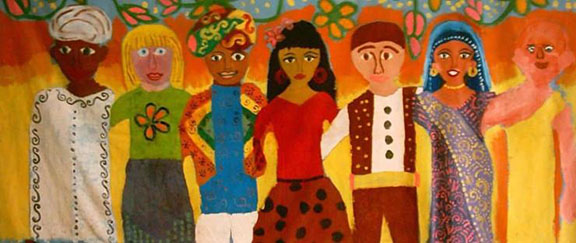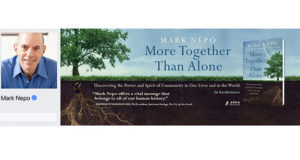 Celebrated author and spiritual teacher Mark Nepo’s new book, More Together Than Alone: Discovering the Power and Spirit of Community in Our Lives and in the World, is a reflection on, and inspiration for, who we can be as a world community when we discover “we are they.”
Celebrated author and spiritual teacher Mark Nepo’s new book, More Together Than Alone: Discovering the Power and Spirit of Community in Our Lives and in the World, is a reflection on, and inspiration for, who we can be as a world community when we discover “we are they.”
QUESTION: What inspired you to write about the power and spirit of community?
MARK NEPO: In the Hindu Upanishads, there’s a passage that speaks to how those who become wise lose their names in the Great Oneness, the way rivers lose their names when they flow into the sea. In this transformation from the solitary to the communal, there’s a mysterious physics that each generation has to relearn regarding what is possible when we can work together. Time and again, we’re asked to discover, through love and suffering, that we are at heart the same. How do we come to this knowledge in our lives, in our families, and in our communities? What brings us together and what throws us apart? How do we inhabit what we have in common as well as what makes us unique in ways that deepen our daily practice of service and compassion? To explore these questions, I have gathered stories and lessons from across cultures and history, which reveal moments of community and the qualities of being and relationship that bring people together. My aim is to affirm that, despite the hardships always present, we are more together than alone.
The aim of this book is to lift up the thread throughout history that shows our lineage of working well together, living well together, and helping each other through difficult times. In my other books, I use my life as a common example of passages we all go through. But since this book focuses on the dynamics of community, I draw on historical and contemporary examples of passages we all face in relationship. When we can care deeply and give freely, there is a natural evolution from the exploration of an inner self to the practice of self and other in the world. In this regard, the work of community applies Spirit in the world.
QUESTION: We live in a highly divisive world today. What do you see as our unique challenges at this time and what we can learn from them?
MARK NEPO: We live in a time, globally, when people have stopped listening to each other, when fear keeps escalating into violence. It’s easy to perpetuate this fear and violence and isolation, and to believe that life is disjointed and that people are cold and barbaric. But I remain convinced that there is a living lineage of human kindness and cooperation, which needs to remembered and uplifted. Each story models courage and care. Each story holds lessons for us to use today. We need to learn from this lineage because somewhere another child is being born who will ask us things we don’t yet know, and we must have some sense of how to account for our time on Earth. Ours is a complicated era and so we need every resource and example of heart and resilience we can find. It is both comforting and challenging to realize that no one person can wrestle from the Earth the song of how we can survive together and no one voice can sing that chorus. The stories of community in this book help us accept and inhabit the spiritual fact that we need each other more than ever.
QUESTION: What are some of the deepest lessons you’ve learned in delving into this subject?
MARK NEPO: This book took twelve years to research and write and two more years to edit and revise. And I’d have to say that one thing that keeps surfacing through all the stories cross-culturally throughout history is that when broken by tragedy, we’re very close to being ethical and loving. Yet when overrun by fear, we often think self-interest will protect us from the hardships of life, when all it does is consume us until we add to the hardships wearing on others, unwilling to own the harm we inflict. Time and time again, we can see that the moral conscience of a society is measured by how well it threads its justice with its compassion.
QUESTION: You use the phrase, “We are they.” This is an essential teaching in Integral Yoga. Would you share your view?
MARK NEPO: I was born in Brooklyn, New York, six years after World War II. During my lifetime, there has been a slow, steady awakening of community that has upheld America as the land of the free. Through all this, I have grown to understand that, different as we are in what we believe, there is no they. We are they.
And so, I try to stay true to what I know while listening to the opposite views of others. More and more citizens are losing themselves in a world built on fear and hate, where tolerance for difference is tissue paper thin, and their understanding of security is based on striking out against others.
As I witness the racism, sexism, xenophobia, and unprocessed anger that is being unleashed, I fear that our isolation and self-interest, as a government and a people, have poked and stirred the darker angels of our nature. Now, we are forced to take our turn in facing the ever-present challenge: to give in to fear or to empower each other to be brave enough to love, brave enough to discover and accept that we are each other.
It seems the need to reanimate a true sense of community is more important than ever. Under all our differences, our capacity to behold, hold, and repair what we have in common is part of a kinship that goes back to prehistoric clans that survived the elements by caring for each other. We need to recover and extend that kinship of care. I hope my book is a contribution to the reawakening of our common humanity and our common capacity.
QUESTION: Would you share a story or two from the book?
MARK NEPO: Yes, here are two. In the first, Elie Wiesel recalls the Holocaust death march he and thousands were forced to make in the ice and snow of the eastern European night; forced to run barefoot for hours toward Buchenwald. In anticipation of the Allied forces, the SS butted and pistol-whipped the emaciated prisoners on and on. Anyone who slowed or stopped was trampled. Those who fell were shot. In the midst of this hell, a poor soul near Wiesel stumbled to the hard ground. Others nearby fell on top of him. But why? Because they knew he would be killed? Because without thinking they hoped that the SS wouldn’t know which of them to shoot? Because some in their exhaustion were ready to surrender their broken lives to keep the bullet from ending his life? There was too much chaos in the air. The guards just beat them all till they got to their feet.
Of all the harrowing, awful, and poignant events Wiesel witnessed as a fifteen-year-old, this small anonymous moment of community is what has stayed with me. I imagine it at the oddest times, while driving home in the rain, while walking our dog in the light snow. It won’t let go of me. I think it is a painful koan that holds the essence of community. As kind and brave as it is brutal, this moment is a testament to the lengths we’ll go to care for each other, if led or pushed to our true nature. In such pain, in such desperate circumstances, in a frame of mind beaten and starved into numbness, what made these men throw their lives into a pile of compassion? This is real knowledge we need to understand. For doesn’t the strength of true community wait in the space between us and the fallen?
The second story of unexpected community is more recent. It took place just off the old town square in Santa Fe, New Mexico. One of the oldest bookstores in the city, Collected Works, was moving about three blocks from San Francisco Street to Galisteo. On the day of the move, over a hundred volunteers showed up and formed a line from the old storefront to the new. And one by one, they passed book by book, all day long, until the move was complete. This is a metaphor for how people show up, across time, to help move the stories of the tribe from one living home to another, a book at a time, a person at a time, just off the public square, story by story, hand by hand. At our best, we are stewards of knowledge that everyone needs but which no one owns, passing what matters from seeker to seeker, from generation to generation.
It is my hope that, by understanding authentic moments of community, we can affirm that community is real and possible—beyond any illusion or deception. For no one can hide the truth of our failings or dismantle our better selves. The lessons gathered here are meant to be neither cynical nor idealistic, but resilient and useful. It is my hope and belief that by rediscovering how to work together, with respect and love, we can build a better world.
About Mark Nepo:

Mark Nepo moved and inspired readers and seekers all over the world with his #1 New York Times bestseller The Book of Awakening. Beloved as a poet, teacher, and storyteller, Mark has been called “one of the finest spiritual guides of our time,” “a consummate storyteller,” and “an eloquent spiritual teacher.” His work is widely accessible and used by many and his books have been translated into more than twenty languages. A bestselling author, he has published twenty books and recorded fourteen audio projects. In 2015, he was given a Life-Achievement Award by AgeNation. And in 2016, he was named by Watkins: Mind Body Spirit as one of the 100 Most Spiritually Influential Living People, and was also chosen as one of OWN’s SuperSoul 100, a group of inspired leaders using their gifts and voices to elevate humanity. In 2017 Mark became a regular columnist for Spirituality & Health Magazine and he also contributes to Integral Yoga Magazine.

